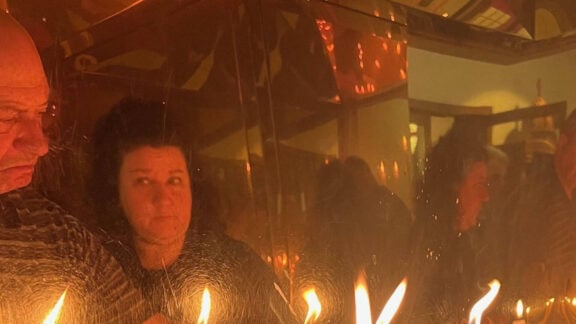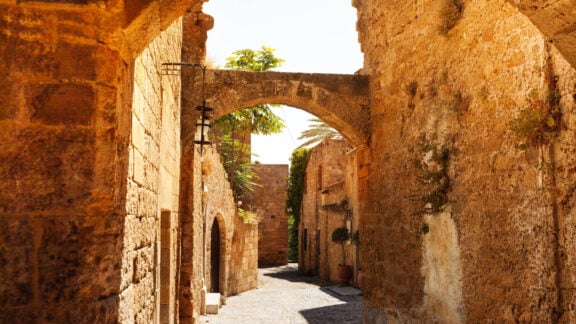Julian Hill is assisting the new-minted minister for multicultural affairs, Tony Burke in citizenship and multicultural affairs. He enters the room and in a burst of enthusiasm says, “I fell in love with Greece”.
“I’d always meant to go there – my daughter had been there on her gap year – everyone in the family seems to have been there, I’ve stuffed up.
“Athens is a buzzing city of villages – it all suddenly made sense to me,” he reflects on his Greek friends and colleagues.
“It was about 42°, hot, but yeah, an incredible vibe in Athens and Greek islands… who can go past them!” he says.
Championing multiculturalism: The ‘Towards Fairness’ report
The minister pivots into ‘Towards Fairness – a Multicultural Australia for all,’ the report launched in July by the former multicultural minister, Andrew Giles.
“It is a thorough deep dive, a serious and thoughtful piece of work reviewing our multicultural policy settings for a generation or more.”
“The government accepted and endorsed the key themes of inclusion, belonging, commitment, identity… and it will shape policy, and investments for years to come,” says Hill.
The report is also an opportunity for bipartisanship in multiculturalism –the opposition could see multiculturalism also as theirs, like they once did.
Hill is not convinced. “Peter Dutton is one of the most divisive, nasty political leaders we’ve ever seen in this country.”

Confronting divisive politics: Critique of Dutton
The leader of the opposition, Dutton called for a blanket ban of Palestinians entering Australia as refugees for which Hill accuses him of “politicking”, and “seeking partisan advantage around Gaza”. “A small number of people are fleeing death and war and have family in Australia – it speaks for itself.”
Hill was elected to federal parliament in 2016 as the member for Bruce a large electorate in southeastern Melbourne that includes suburbs such as Dandenong, and Endeavour Hills, “some of the most multicultural in Australia.”
He says he was”bushy-tailed”, and “bright-eyed” but says his optimism was thwarted by Scott Morrison’s and Peter Dutton’s, “legislative priority to weaken Australia’s laws against racial hate speech.”
It was a “leadership lesson” of how “what is said in Canberra can have real-world impacts.”
In 2016, Dutton criticised the late- Liberal prime minister, Malcolm Fraser – a founder of multicultural policy – for allowing Lebanese immigrants into Australia in the 1970s. Fraser’s immigration minister, Ian Macphee, called Dutton’s reflection on the immigration policies of the 1970s, “outrageous”. Many of the Lebanese who arrived were Christian, says Hill, “which illustrates the point that it is not fact-based”.
The minister wants the Liberal Party “do something about Peter Dutton and that we choose to argue over something else.”
“Australians have far more in common than differences,” says Hill despite Dutton’s wedging on culture and race.
“We are all equal under the law. We all have one vote. We want the same things.”
“No one comes to this country wanting to be poorer” Most people from the communities that he meets talk to him “about the cost of living”.
The politician finds an opportunity to sell his government’s wares, “Everyone’s getting a tax cut” and “getting the energy rebates flowing this month.”
“Everyone is proud of Medicare, which Labor fought hard for,” he says.
Social cohesion as process, not an end state
Pressure on Australia’s social cohesion has mounted recently – the war between Israel and Hamas has produced a sharp rise of anti-Semitism. In Western Sydney, the controversial Assyrian Orthodox cleric Bishop Emmanuel, who attacked homosexuality, COVID vaccinations and Islam was stabbed by a radicalized young man. The event then led to street rioting.
“I also add Islamophobia – yes, social cohesion is under stress – we can have a long list.”
“Now with social media and technology, that events outside Australia in the world affect our communities.
Social cohesion “is not an end state, it’s a process,” Hill believes and says it “improves when we work at it.”
Hill underscores the social contract: “Leaders have a responsibility to set the tone, political I have talked about, but also faith and community leaders – at every level.”
Three things are essential to social cohesion he says, “government policy and commitment”, the notion of “a fair go for all”, and “community leadership.”
He maps Labor history in multiculturalism, the “50 years since the Whitlam Labor government’s Racial Discrimination Act” adds that “last year it was 50 years since the Whitlam Labor government abolished the White Australia policy.”
To ensure multiculturalism goes beyond homilies, it “requires targeted investments and particularly to help new people settle in”.
For Hill, established communities, like the Greek one, “need different supports particularly in aged care.”
“The real magic happens, with the intangible role of community leadership, when we don’t just celebrate and pass on traditions, which is important, but where we share those traditions with others.

Competing diversities, a necessary democratic tension
A day before the interview the prime minister intervened to include a question on ‘gender and sexual identity’ in the next census. The government had originally ignored the question, fearing it would inflame a clash of diversities, between conservative faith-based communities, and LGBTIQ communities.
As a gay man, and a father, Hill is not concerned and sees the tension as part of democracy.
“In any diverse society, there are always competing rights and democracy balances them out.”
He tells an anecdote of how when visiting one of his local Greek churches in 2017, to meet the parish committee, “during the marriage equality [survey] period” the priest very politely said ‘We’re against this marriage equality, by the way’.
“A couple of the committee members leaned over and whispered, ‘We’re ok with it our grandson is like that, but we just don’t want the marriages in the church.'”
Multicultural media – a democratic aid
Hill says ethnic media are critical public interest journalism, particularly during crises like COVID-19 where it had a frontline role, and in promoting social cohesion.
“In an environment where there are fewer and fewer information sources where people can get common information, trusted media are more important than ever.
“Neos Kosmos, Il Globo and others are trusted decades-old voices of the community that reflect the community’s life.
“These are community news outlets, and conduits between, government and business, and the broader Australian community”.
For Hill good media facilitate discussion and debate and says, “Long may that continue.”
He believes that social media “has atomized our society”.
“When we don’t agree with something, we create this world where we unfriend, and we unfollow, and we block.
“God forbid, we may change our mind.”
Diaspora – super dating agents of the economy
Hill says Greek Australians and all diasporas, born and educated in Australia, are ideal conduits in international trade and cultural relations.
“I see in my daily life, dozens of different diaspora communities, with the language skills and the business connections, particularly in the SME and small business sector who facilitate and do create two-way trade.”
Greek Australians may soon be conduits between Greece, Australia, India, or China, as Greece pivots east to its ancient links. New economic, migration, strategic, as well as cultural relations between Greece and India have developed.
“India, or China – two economic elephants in the world – with over a billion people each, diaspora will play a major role in our economic future, and for our mutual understanding, and to build peace.
“Diasporas can be like super dating agents of the economy.
“Embassies around the world to bring those chambers together and to be the dating agent diplomats,” says Hill.

The challenge of maintaining Greek
Modern Greek faces challenges –in fact, languages have dropped off the nation’s agenda. The Australian Universities Accord in 2023 had 47 recommendations, yet there was hardly a reference to languages, other than First Nations’ languages.
“It’s got worse, not better, unfortunately over the last few decades.
Hill blames the dominant position of English globally as the “international language in business and diplomacy.
“It is mediated, or ameliorated by technology because you can increasingly do basic communication and you can do when you’re travelling.”
He lauds community language schools for maintaining languages and says the government is providing “resources and grants of $30,000 or more to all the registered community language schools in Australia.”
As is the case for Modern Greek, “there are critical mass issues” he says.
“You need a certain number of students to make a VCE subject, or a university subject viable – but couldn’t overstate the importance of the community-based language provision for keeping particularly those smaller languages alive.”
Australia has largely succeeded in navigating the complexities of multiculturalism, and Julian Hill focuses on that. He sees the Greek Diaspora and other diasporas, as conduits to global trade, and peace. Bipartisanship is crucial to multiculturalism, but Hill remains sceptical on what he sees as the opposition leader’s plunder of the culture wars.








